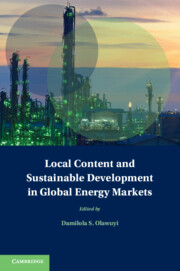Book contents
- Local Content and Sustainable Development in Global Energy Markets
- Reviews
- Treaty Implementation for Sustainable Development
- Local Content and Sustainable Development in Global Energy Markets
- Copyright page
- Contents
- Preface and Acknowledgements
- Abbreviations
- Editor
- Contributors
- Part I Introductory Context and Principles
- 1 Local Content and the Sustainable Development Nexus
- 2 Defining the ‘Local’ in Local Content Requirements in the Oil and Gas Sector
- 3 Local Content Measures and the WTO Regime: Addressing Contentions and Trade-offs
- 4 Local Content Requirements in Extractive Industries: A Human Rights Analysis
- 5 Upgrade of Local Suppliers in the Global Production Network: The Success or Otherwise of Local Content Regimes
- Part II Case Studies
- Part III Lessons Learned and Future Directions
- Index
4 - Local Content Requirements in Extractive Industries: A Human Rights Analysis
from Part I - Introductory Context and Principles
Published online by Cambridge University Press: 05 March 2021
- Local Content and Sustainable Development in Global Energy Markets
- Reviews
- Treaty Implementation for Sustainable Development
- Local Content and Sustainable Development in Global Energy Markets
- Copyright page
- Contents
- Preface and Acknowledgements
- Abbreviations
- Editor
- Contributors
- Part I Introductory Context and Principles
- 1 Local Content and the Sustainable Development Nexus
- 2 Defining the ‘Local’ in Local Content Requirements in the Oil and Gas Sector
- 3 Local Content Measures and the WTO Regime: Addressing Contentions and Trade-offs
- 4 Local Content Requirements in Extractive Industries: A Human Rights Analysis
- 5 Upgrade of Local Suppliers in the Global Production Network: The Success or Otherwise of Local Content Regimes
- Part II Case Studies
- Part III Lessons Learned and Future Directions
- Index
Summary
When a State requires foreign investors to hire local workers or engage other local resources as a condition to access its natural resources, it puts in motion a series of events with unanticipated consequences. The State’s local content requirements, while seeking to build indigenous capacity, could artificially protect certain individuals or entities. The latter, in turn, may use their privileged position to delay payment for goods and services. The requirements could also encourage the development of local shell entities, which deprive work to those most qualified to perform it. These developments, along with associated corruption, have profound human rights implications, whether as to fundamental principles of equality and dignity or more specific matters, such as the right to work, the right to pay for work, and the right to property. This chapter examines the human rights implications of local content requirements and sets forth a model, based principally on the UN Guiding Principles on Business and Human Rights, to help harmonize investment objectives with human rights.
- Type
- Chapter
- Information
- Publisher: Cambridge University PressPrint publication year: 2021

